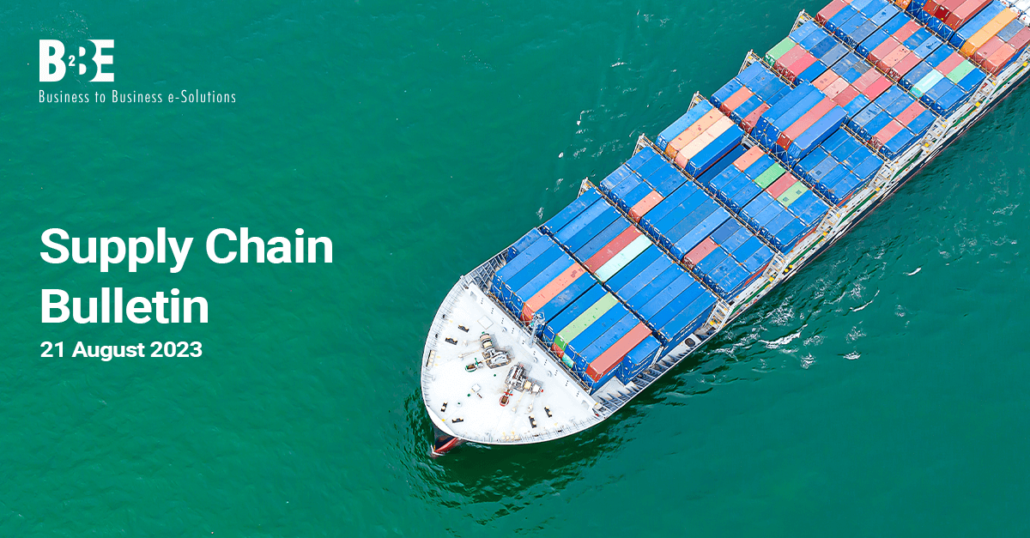This is your weekly supply chain bulletin from B2BE for the week starting 21st August 2023.
Each week, we bring you a rundown of the latest trends in the news from across the supply chain industry. We cover the issues most important to you, bringing you useful links to the full articles. This ranges from news on various supply chain disruptions to strategies to lessen the damage. We also include other relevant supply chain related updates. If you missed it, you can read last week’s supply chain bulletin here. Read on to see what’s making the news this week.
Nestle UK and Ireland double stack rail supply chain
Nestlé UK and Ireland are implementing a new approach to rail container technology to enhance their net-zero efforts. The innovative rail container uses double-stacked pallets, with a roof-raising mechanism that allows products to be double-stacked up to the ceiling. This approach increases the capacity for products compared to traditional containers, therefore reducing the number of trips needed and cutting down emissions. The new containers were used to transport Purina products from a distribution park to a Tesco distribution centre in the UK. This initiative also aligns with Nestlé’s commitment to reducing its environmental impact and supports a move away from using road freight.
Supply chain pressures cause 82% of UK shoppers to experience out-of-stock products
As retailers continue to grapple with supply chain disruptions due to factors like the ongoing effects of the COVID-19 pandemic, geopolitical conflicts such as Russia’s actions in Ukraine, and climate change-related challenges, a recent survey conducted by Retail Insight, a leading provider of store operations execution software, has shown that 82% of UK shoppers have experienced out-of-stock products in the past 12 months. This marks an 11-percentage point increase year-on-year. Additionally, 71% of respondents reported that product availability had become more of a problem since the start of the pandemic. Furthermore, 75% have noticed more out-of-stocks since the beginning of the cost-of-living crisis.
Shoppers have blamed poor product availability on a number of factors. These include: the growing cost of food production (57%), inflation (56%), increased costs of logistics (43%), and the impact of Brexit (40%). The accuracy of product availability on the shelf has also been noted as a concern, with inventory records typically only 50-60% accurate. These shortages not only affect the customer experience but can also result in lost sales and reduced long-term loyalty.
New sustainable procurement policy introduced by South Australian Government
The South Australian state government has introduced a new Sustainable Procurement Policy. It aims to achieve net-zero emissions by 2050 across its infrastructure and transport programs. Under the policy, the government will request carbon emissions targets data from suppliers bidding for major contracts. Particularly those valued over A$50 million. The government plans to leverage its procurement power to purchase climate-smart goods and services that reduce its carbon footprint and promote a transition to a low-emission economy. The policy also includes measures such as requesting low emission or carbon-neutral goods and services, assessing suppliers’ commitment to low-emission outcomes during the tender process, and requiring contractors bidding on work over A$50 million to have organisational emission reduction targets. Additionally, suppliers with vehicle fleets as part of service delivery contracts will be required to participate in the government’s EV Fleet Pledge program, which encourages the transition to electric vehicles.
Productivity and resilience of freight connection boosted by new supply chain strategies
Finally, New Zealand has launched its first-ever national freight and supply chain strategy. The strategy aims to enhance the productivity and resilience of its ports, freight, and shipping sectors. A collaborative effort between the government and industry, it focuses on several key areas. These include: ports, road freight, shipping decarbonisation, data sharing through connected systems, and preparedness against disruptions and disasters. The strategy aims to make New Zealand’s freight system more efficient, reliable, and aligned with the country’s climate goals. It will also address vulnerabilities highlighted by events such as COVID-19, severe weather, and disruptions in international supply chains. The strategy supports the decarbonisation of the trucking sector and encourages the use of zero-emissions technologies.
About B2BE
B2BE delivers electronic supply chain solutions globally, helping organisations to better manage their supply chain processes, providing greater levels of visibility, auditability and control. We’re driven by a passion for what we do, inspired by innovation, and underpinned by a wealth of knowledge. With over 20+ years of experience, the B2BE teams operate worldwide.
欲了解更多信息,请访问www.b2be.com。
